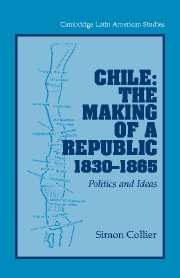Book contents
- Frontmatter
- Contents
- Acknowledgments
- Abbreviations Used in the Notes
- Introduction
- PART I THE NEW REPUBLIC, 1830–1865
- PART II FROM PORTALES TO MONTT, 1835–1851
- PART III MID-CENTURY ATTITUDES
- PART IV ORDER AND LIBERTY, 1851–1864
- 9 The Conservative Defection, 1851–1858
- 10 The Triumph of Liberty, 1859–1864
- Sources
- Index
10 - The Triumph of Liberty, 1859–1864
Published online by Cambridge University Press: 24 July 2009
- Frontmatter
- Contents
- Acknowledgments
- Abbreviations Used in the Notes
- Introduction
- PART I THE NEW REPUBLIC, 1830–1865
- PART II FROM PORTALES TO MONTT, 1835–1851
- PART III MID-CENTURY ATTITUDES
- PART IV ORDER AND LIBERTY, 1851–1864
- 9 The Conservative Defection, 1851–1858
- 10 The Triumph of Liberty, 1859–1864
- Sources
- Index
Summary
Manuel Montt's Second Civil War
This time the entire Army remained loyal to the government. With no national hero like General Cruz to help, the Liberal-Conservative Fusion's “revolutionary committee” had to improvise forces of its own. Its strategy was to bring the government to its knees by fomenting urban insurrections and sweeping the Central Valley with guerrilla bands (montoneras) organized by sympathetic hacendados. None of the urban risings achieved more than temporary success. On February 12, 1859, San Felipe was seized by local rebels, at the cost of the accidental death (from a stray bullet) of the Intendant's sister-in-law. The future Conservative politician Abdón Cifuentes, who lived there, contrasted the impeccable behavior of the revolutionaries with that of the civic guards and soldiers who recaptured San Felipe six days later and allowed it to be brutally sacked. Poor Cifuentes lost his first frock-coat in the tumult. A French nun arriving to work in the town's hospital reported eighty deaths.
The rising in Santiago, staged by fifty mutinous civic guards, was snuffed out almost immediately. The Fusion's effort in Valparaiso (February 28) was entrusted to the poet Guillermo Blest Gana – “good for many things but not for running a revolution,” wrote one of the rebels. He was almost immediately arrested. The rebels attacked the public warehouses and set fire to the main door of the Intendancy.
- Type
- Chapter
- Information
- Chile: The Making of a Republic, 1830–1865Politics and Ideas, pp. 223 - 252Publisher: Cambridge University PressPrint publication year: 2003

